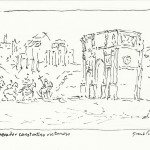Violence is the common hell of all who are associated with it. Â –The House Gun
What happens when an upper-middle class, white South African family becomes the victim of violence? What happens when that violence is perpetuated by a member of their own family? How do a successful, community-minded physician and her religious, corporate husband cope when they discover that their only son, an architect, committed murder? And last, how do they deal with their son’s selection of a black man in post-apartheid South Africa to represent him? These questions form the core of Nadine Gordimer’s extraordinary novel, The House Gun, a must-read for smart women.
Our group wrestled with these issues last night at our monthly meeting, and the conversation was spirited. Â Much of the discussion centered on the difficulties Claudia and Harald faced coming to terms with the truth about their son, Duncan. Not only does he murder one of his roommates, they discover that Duncan’s act was a crime of passion committed when he discovered his girlfriend and ex-male lover having sex on their communal sofa. (By the way, this is not a spoiler. All this is revealed in the opening pages of the novel.)
Much of how they deal with this painful tragedy reflects their sense of personal responsibility, wondering where they might have gone wrong. Their guilt is compounded by the post-apartheid world in which they live and their response to Duncan’s lawyer Hamilton Motsamai. While trying to wrap their heads around the news that shattered their life, they also confront their biases. “She’s (Claudia) not one of those doctors who touch black skin indiscriminately along with white, but retain liberal prejudices against the intellectual capacities of blacks. Yet she is questioning, and he is; in the muck in which they are stewing now, where murder is done, old prejudices still writhe to the surface.”
We were so dazzled by Gordimer’s writing and subject matter that we added AÂ Sport of Nature to our 2012-2013 reading list. If you haven’t discovered this Nobel Prize winning author, then don’t wait any longer. There are many rewards to be found on her pages. This book that was unanimously applauded by our reading group, and we are certain it will be well-received by yours as well.
(By the way, discussion questions can be found under “Other Smart Reads.”)
 The New York Times critic Liesl Schillinger writes, “In
The New York Times critic Liesl Schillinger writes, “In 

